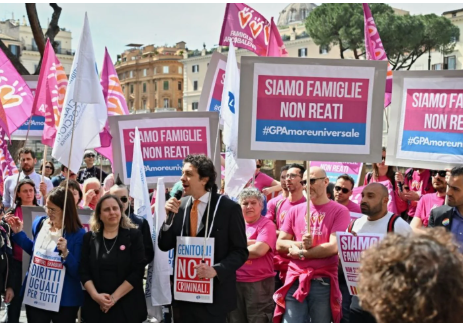Italy’s Surrogacy Law Sparks Controversy
The Italian Senate has enacted a law declaring surrogacy a “universal crime,” which expands upon the existing ban on surrogacy established in 2004. It criminalizes Italians seeking surrogacy abroad. The term universal crime aligns surrogacy with severe violations like genocide.
Legal Status of Surrogacy Worldwide
Countries exhibit diverse regulations regarding surrogacy.
- Greece permits non-commercial surrogacy, granting legal parenthood at birth.
- In California, commercial surrogacy is legal, allowing financial compensation for surrogates.
- Conversely, France and Germany prohibit surrogacy but enable legal connections through adoption.
- The UK allows surrogates to be legal parents initially, with a simpler process for transferring parenthood to intended parents.
Government’s Justification
Italian Prime Minister Giorgia Meloni supports the new law, labeling it common sense. She argues it protects women and children from exploitation. The government promotes traditional family values, aligning with the far-right Brothers of Italy party.
Critics contend that the law restricts reproductive rights and harms families. They argue it limits choices for intended parents, particularly same-sex couples. The European Court of Human Rights stresses the necessity for legal relationships between children and intended parents, a point overlooked by the new law.
Impact on Same-Sex Couples
Same-sex couples in Italy face hurdles in parenthood. They are barred from IVF and adoption. The new law compounds their challenges, pushing them to consider relocating or facing severe penalties, including fines up to €1 million.
The law reflects a rising trend in populist politics, which raises concerns over the erosion of rights for women and LGBTQ+ individuals. Critics fear this sets a precedent for further restrictions in reproductive rights and family dynamics.
Important Facts for Exams:
- Universal Crime: The term “universal crime” categorises surrogacy alongside atrocities like genocide. This classification has sparked intense debate over reproductive rights and legal implications for parents and children.
- Brothers of Italy: The Brothers of Italy is a far-right political party. It promotes traditional family values and opposes same-sex marriage and adoption, influencing Italy’s recent surrogacy legislation .
- European Court of Human Rights: This court advocates for children’s rights in surrogacy. It emphasises establishing legal relationships between children and intended parents, a perspective overlooked by Italy’s surrogacy law.
- Legal Parenthood in Greece: Greece allows non-commercial surrogacy. This law enables intended parents to gain legal parenthood at birth, contrasting sharply with Italy’s stringent surrogacy prohibitions and criminalisation.
Month: Current Affairs - December, 2024
Category: Legal & Constitution Current Affairs


